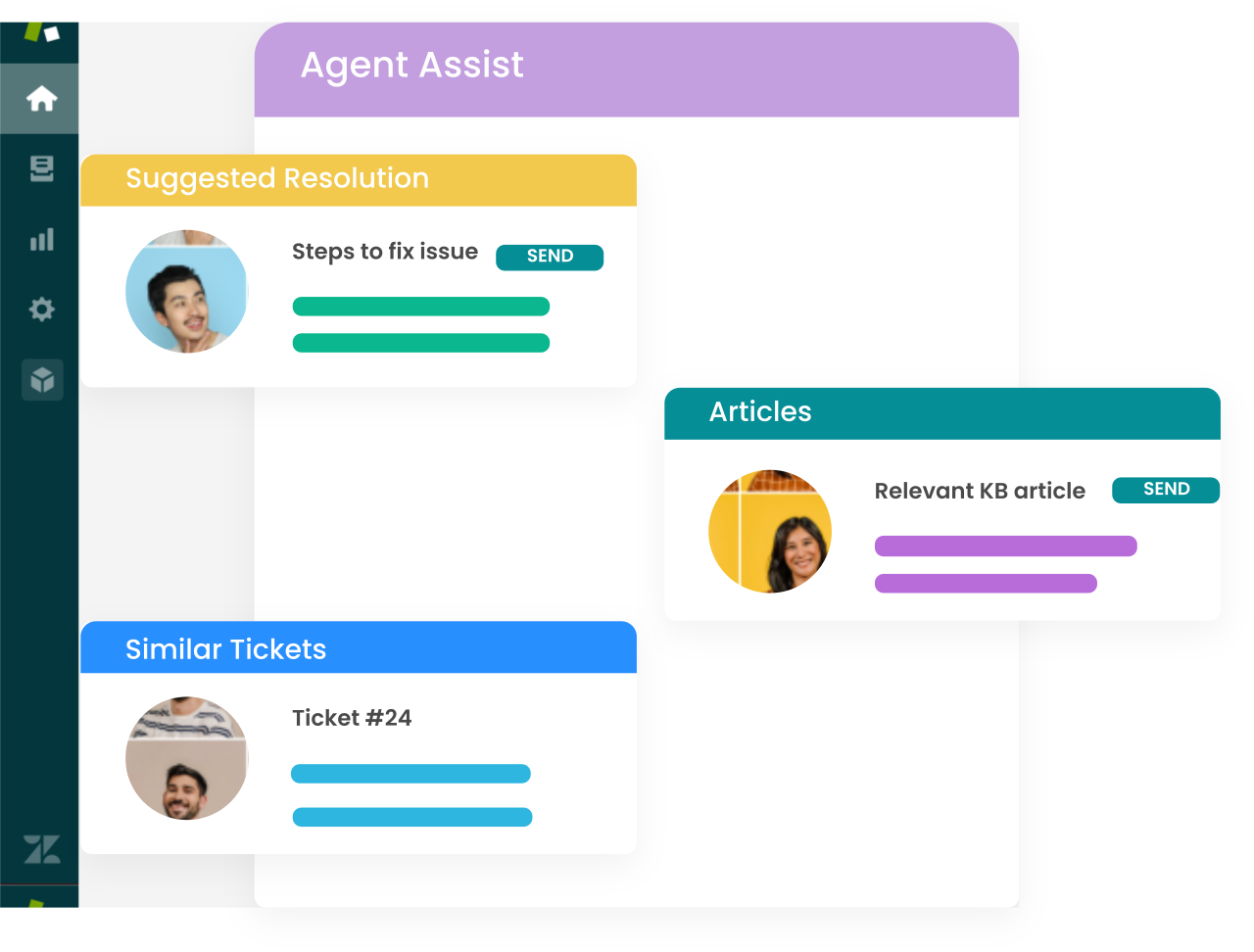How to Improve NPS Score with AI-Powered Customer Service
Net Promoter Score, known simply as NPS, is widely considered to be the best way for businesses to measure the customer experience. Developed by Fred Reichheld of Bain & Company in 2003, the NPS system provides a concise measure of customer loyalty and is a valuable tool for assessing business performance and customer journey. The score is based on data from a single-question survey. Utilizing AI-powered customer service strategies and the right AI tool can significantly improve net promoter score by enhancing customer support, thereby boosting NPS scores and strengthening customer relationships.
How is NPS calculated?
Net Promoter Score (NPS) is calculated by asking customers a single question: "On a scale of 0 to 10, how likely are you to recommend our [product/service/company] to a friend or colleague?" Based on their responses, customers are categorized into three groups:
Promoters (score 9-10): These enthusiastic and loyal customers will likely recommend your business.
Passives (score 7-8): These customers are satisfied but less enthusiastic than promoters. They might be open to switching to competitors.
Detractors (score 0-6): Detractors are unhappy customers who are unlikely to recommend your business and may even speak negatively about it.
The NPS is calculated by subtracting the percentage of detractors or dissatisfied customers from the percentage of promoters. The NPS scale ranges from -100 to +100. A high positive score indicates to business leaders a strong base of promoters and overall customer satisfaction, while a low or negative score highlights areas for improvement in customer experience.
Why is NPS important for customer satisfaction?
Administering this survey question is a straightforward process. But what’s important in the survey process is how businesses respond to a low NPS score and the steps they take to improve their operations.
Net Promoter Score (NPS) is crucial for businesses as it measures customer loyalty and satisfaction. NPS provides insights into loyalty levels by categorizing customers into promoters, passives, and detractors. High NPS scores are linked to growth and customer retention. NPS is valuable feedback and offers actionable insights for improvement while benchmarking guides strategic decisions. It fosters a customer-centric approach, encourages continuous improvement, and helps businesses enhance customer relationships for positive outcomes. A high NPS is often linked to a loyal customer base, improved customer retention, and higher profitability, which are essential for sustainable business success.
How to improve NPS scores Using AI?
Generally, one of the most efficient ways to make simple, lasting improvements on an NPS score is to use AI tools.
Below, you will find details on how to improve your NPS scores using AI:
Proactively reaching out to customers. With any business, common issues result from confusion or just the nature of the product/service. Contacting clients before they even complain can vastly improve the customer experience.
Triaging customer issues. When customers have problems or questions, it can take time for a customer service representative to effectively address them. AI can help you triage and even resolve common customer issues automatically.
Reduce the number of ticket escalations. Escalating support tickets to engineering results in long wait times and tons of effort expended by staff and customers alike. AI can help you leverage product and user context to discover problems and reduce escalations.
Turning Happy Customers into Promoters. Those who responded positively to whether or not they would recommend your services were happy with your service. However, they may not remember to recommend your brand (or may not have an opportunity to do so) for quite a while. Therefore, prompting them to post their thoughts on Twitter, Facebook, or another social media service can result in further advertising and endorsement for your brand.
Sentiment Analysis and Feedback Insights. AI-powered customer service can analyze customer sentiment through natural language processing techniques. By assessing the tone and context of customer interactions, businesses can understand customer satisfaction levels, identify common pain points, and uncover areas for improvement. Leveraging these valuable insights, companies can make data-driven decisions to enhance their products, services, and overall customer experience, ultimately boosting NPS.
Using AI tools like chatbots and question sequences to gather feedback from customers can provide valuable insights for improvements.
Customer experiences (CRC) are critical to all business operations. People recommend our products/services because they are delighted with our brand’s experiences. Net Promoter Scores are key metrics to know if your product or service keeps the customer happy. A lower score indicates that more customers are dissatisfied with their service provider than the average. Understanding customer perceptions in the CX industry should provide managers with actionable insights. A customer-centric brand should complement NPS surveys with other metric tools to provide detailed CX analysis.
Using AI-Powered Live Chat to Improve NPS

Live chat can contribute to enhancing the Net Promoter Score (NPS) in several ways:
Improved customer satisfaction: Live chat provides immediate assistance and allows customers to resolve their issues or get answers to their questions in real-time. The quick response time and personalized support can significantly improve customer satisfaction, leading to higher NPS scores.
Enhanced customer experience: Live chat enables a more interactive and convenient customer experience. Customers can engage in real-time conversations, receive personalized recommendations, and get help with their needs. This level of engagement and tailored support can positively impact the customer experience and, in turn, boost the NPS.
Efficient issue resolution: Live chat enables efficient issue resolution by eliminating the need for customers to navigate complex phone menus or wait for email responses. Agents can provide prompt solutions, guide customers through processes, and address concerns effectively. This streamlined support process reduces customer effort and frustration, increasing the likelihood of positive NPS ratings. Additionally, live chat interactions can be analyzed to provide a full overview of all customer data and metrics, helping businesses make informed decisions.
Proactive support and engagement: Live chat platforms often allow agents to proactively engage with website visitors based on their browsing behavior or predefined triggers. Companies can address customer needs by offering proactive assistance before they become problems or frustrations. This proactive approach can give customers a positive impression and improve NPS scores.
AI can quickly categorize and deal with all of the above issues. At IrisAgent, we have built a proactive customer service platform to help you improve your self-service and NPS and keep your current and future customers happy!
Tips for Improving NPS Score
Understand who your detractors and promoters are
It is useful in identifying the customer segments and retaining customers by defining the detractors and promoter groups. Both customers who like your products/services and who experience negative experiences are important. Transform detractors into promoters so they can keep going on. Compare NPS and your industry using the NPS benchmark calculator.
Work on valuable customer feedback to improve the NPS survey score
It won't suffice for us to get NPS feedback. Root cause analysis of the positive feedback and negative feedback is effective in building a stronger brand. Customers have an interest in how they can help your company grow. If you get feedback from people you know, they can help you get the best net promoter rating possible. What is your chance of recommending someone from one to 10 years ago to your friend? NPS identifies the customer groups in three categories: Promoter, Passive, and Detractors.
Help your customers with live engagement
The Net Promoter Score improves with reduced response time and average handling time (AHTs). Clients are demanding fast responses to questions or problems. Providing faster support will help meet customer expectations and lead to valuable marketing efforts. If support is unavailable longer than usual with long response rate, the ticket indicates poor customer experience. That will negatively influence your whole reputation. The ability for customer engagement is an integral component of well-planned customer engagement.
Get the Whole Company on Board with the Importance of a Good NPS
It is important that NPS is a core and fundamental part of the business culture of the organization. If you want to improve NPS, you need to ask employees daily what they need to do to integrate it into the entire company cultures. They're the people your consumers will meet first and make the strongest impression on which you can base your survey score, directly affecting your NPS. Sometimes, it is difficult to recruit people passionate about customer service 100% of the time.
Segment your customers for better planning
NPS surveys are excellent tools that allow targeting to target specific segments of an audience. Your audience can be segmented based on income, products, services, or consumer personas. If you segment your customers, you can use a range of services to enhance customer experiences. An established NPS hierarchy ensures coordination and planning in the implementation of the NPS plan. Segmenting clients helps you understand your customers' requirements. NPS segments your customer base into 3 distinct categories.
Offer proactive customer service
Reactive responses to customer questions are vital to customer support. Proactive services provide a better customer experience than reactive customer service. Providing proactive customer support is when you anticipate customer needs and offer efficient solutions. Customer support teams do not begin customer interaction — customer support. The specialized support offers the customer service team the opportunity to anticipate their problem before recommending solutions to solve it without asking them. This can affect the NPS.

Send the NPS survey at the right moment of the customer journey
Sending the NPS survey at the right moment of the customer journey is crucial for gathering valuable feedback. Timing is key to accurate feedback; it should follow significant interactions, such as a successful purchase or support engagement. This ensures customers provide insights while their experiences are fresh, helping businesses pinpoint areas for improvement and capitalize on positive moments. In summary, strategically deploying the NPS survey enhances the relevance and accuracy of feedback, empowering businesses to make informed decisions to improve customer satisfaction and loyalty.
Frequently Asked Questions
What is NPS (Net Promoter Score)?
Net Promoter Score (NPS) is a widely used metric in business that assesses customer loyalty and satisfaction. It measures customers' willingness to recommend a company's products or services to others on a scale of 0 to 10. The NPS survey categorizes respondents into three groups: Promoters (score 9-10), Passives (score 7-8), and Detractors (score 0-6). The average NPS increase is calculated by subtracting the percentage of Detractors from the percentage of Promoters.
Why is NPS important for businesses?
NPS is crucial for businesses because it provides a clear and easily understandable way to gauge and measure customer experience and sentiment. High NPS scores indicate satisfied and loyal customers likely to become advocates, driving growth through referrals. Conversely, low scores signal dissatisfaction and the potential for customer churn. By regularly tracking and improving their NPS data, businesses can enhance customer experiences, increase customer retention, and ultimately boost revenue and profitability.
How can AI-powered customer service contribute to improving NPS?
AI-powered customer service can significantly improve Net Promoter Scores (NPS) by enhancing various aspects of the customer experience. Through AI-driven chatbots and virtual assistants, businesses can provide immediate and consistent support, reducing response times and increasing average customer call satisfaction, ultimately leading to higher NPS. AI also excels in data analysis, enabling sentiment analysis to understand customer emotions and identify potential issues that can be addressed proactively.
Personalization is another key factor: AI can tailor interactions, recommendations, and content to individual customer preferences, fostering a stronger emotional connection and boosting NPS, as satisfied customers are likelier to promote the brand. Additionally, AI's ability to collect and analyze vast amounts of customer feedback and behavioral data enables businesses to make data-driven improvements that directly impact and improve NPS score. AI empowers businesses to deliver better, more personalized, and more efficient customer experiences, which drives higher NPS.
What trends can we expect to see in the future of AI-powered customer service and its impact on NPS?
In the future of AI-powered customer service, several trends are likely to shape the landscape and impact Net Promoter Scores (NPS). Firstly, we can anticipate even more advanced AI-driven personalization, where interactions are tailored to individual customer preferences, elevating satisfaction levels and business revenue. Moreover, AI's predictive capabilities will enable businesses to address customer issues before they become problems, reducing NPS detractors.
Ethical AI practices will become increasingly important, as transparency and fairness in AI algorithms will influence customer trust and NPS response rates. Lastly, AI-powered analytics will provide deeper insights into customer behavior, allowing companies to make data-driven improvements directly impacting NPS scores. Overall, the future of AI in customer service promises more seamless, efficient, and personalized experiences that are likely to drive higher NPS scores for businesses that embrace these innovations.
Book a demo today to improve your NPS scores using IrisAgent's proactive customer support platform!



